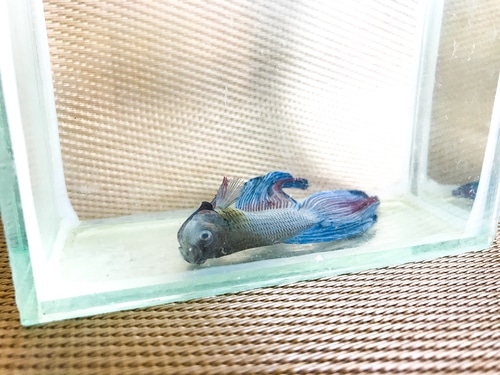If your betta is not moving after a water change, the most likely cause is shock. Water changes can be stressful for fish, so it’s important to make sure you use dechlorinated water that matches the temperature of their tank and gradually add it in over a period of time. It’s also possible they may have ingested air while siphoning out old water or when you added new water back in.
If this is the case, they should start swimming again soon on their own as long as everything else seems normal. If the issue persists for more than an hour or two, try gently tapping around the tank to see if this encourages them to move. If there are still no signs of movement by then, check all levels, including ammonia and nitrite, as these can be toxic to fish and could be causing them distress.
If you recently changed the water in your betta tank and now your fish is not moving, it could be cause for concern. If your betta has stopped swimming or appears to be lethargic shortly after a water change, this could indicate that there was something wrong with the new water or that the change was too drastic. It’s important to check all levels of ammonia, nitrates, and pH before performing any changes to make sure they are safe for your fish.
Additionally, if you’ve made a big shift in temperature or added something like medications or salt into the tank during a water change then it’s possible that these abrupt changes have caused stress on your fish. Check on him often while monitoring his behavior until he returns back to normal activity level. If you went to know more about betta is not moving after the water change, keep reading!
My 3 Tips for [Fish Death and Stress Immediately after a Water Change] ***What Can We Do?***
How Do You Save a Dying Betta Fish After Water Change?
If you suspect your betta fish is struggling after a water change, the best course of action is to first identify the cause. If you change too much water at once or use tap water without conditioners, that could cause stress and shock to your fish. To remedy this situation, do a partial water change using aged aquarium water (i.e., aged 24-48 hours) with dechlorinators added to it and test for ammonia levels in the tank.
Adjust pH levels as necessary by adding buffering agents like sodium bicarbonate or crushed coral if needed. Increase aeration in the tank by adding an air pump and airstone or filter system to ensure adequate oxygen exchange throughout the tank. Finally, make sure there are plenty of hiding spaces in your tank for your betta so he can comfortably rest and recover from any stressors present in his environment.
How Long Does It Take for Betta to Get Used to New Water?
It typically takes betta fish a few days to get used to new water. The process can be sped up by slowly adjusting the temperature and pH of the old water to that of the new tank before transferring them over, as this will help minimize stress levels. Additionally, it’s important to make sure you are using a quality de-chlorinator when setting up your tank, as chlorine is highly toxic for bettas and can cause damage or death if not treated properly.
Furthermore, it’s recommended that you add aquarium salt (half a teaspoon per gallon) in order to reduce any osmotic shock they may experience when transitioning into their new home. With these steps taken, most betta should become accustomed within 3-4 days after being moved into their new environment.
Why Isn’T, My Betta, Moving Much?
If your betta fish is not moving much, it could be due to an underlying health issue. Stress and disease can cause a fish to become sluggish or unresponsive, so it’s important to check for signs of illness before assuming there’s something wrong with the environment. Look for physical signs such as white spots on the body or fins, reddening of the skin, frayed fins, and/or clamped fins.
If any of these symptoms are present then you may need to take your betta fish to a vet for further examination. Additionally, make sure that the water temperature is correct (around 78F) and ammonia levels are low; both factors can contribute to lethargy in a betta fish if not managed properly.
Are Bettas Sensitive to Water Changes?
Yes, bettas are very sensitive to water changes. Water quality is one of the most important aspects of keeping a betta healthy and happy. To ensure that your fish stays healthy and vibrant, regular water changes should be completed at least once every two weeks.
With each water change, you should use dechlorinated or conditioned tap water as well as test the pH levels in order to make sure it’s between 6.5-8.0 for optimal conditions for your fish. Doing so will help keep ammonia levels low and reduce stress on your fish due to sudden shifts in temperature or chemistry, which can lead to disease or death if not managed properly.

Credit: pethelpful.com
Betta is Not Moving Or Eating
If your betta is not moving or eating, it could be a sign of illness. Check the water temperature and levels for signs of stress or disease. If your fish has been inactive for more than a few days and does not respond to food, you should seek veterinary assistance as soon as possible.
In some cases, lethargy can be caused by environmental factors such as incorrect water temperatures or inadequate nutrition. Monitoring your betta’s activity closely will help you determine if there are any underlying health issues that need to be addressed.
Betta Not Moving at the bottom of Tank
If your betta fish is lying at the bottom of the tank and not moving, it could be a sign that something is wrong. It’s important to check the tank’s water temperature, pH, and nitrate levels to ensure they are within proper ranges for bettas. Additionally, if you have recently changed food or added any new items into the tank, this could also cause stress for your fish.
If these steps don’t help improve your betta’s behavior then it might be best to contact a veterinarian specializing in aquatic species as soon as possible.
Why is My Betta Fish Not Moving But Still Breathing?
If your betta fish is not moving but still breathing, it could be a sign of illness or stress. Bettas are very sensitive to changes in water temperature and chemistry, so any sudden change can cause them to become stressed or sick. If you notice your betta is not moving but still breathing, the first thing you should do is test the water parameters – check for ammonia levels, pH balance, nitrates/nitrites, etc.
It’s also important to make sure there aren’t any other signs of disease, such as fin rot or fungus. In some cases, if none of these issues are present and your betta is still lethargic and not eating properly then it may need antibiotics from a vet to get better.
Betta Fish Behavior Before Death
Betta fish, like any other living creature, will show signs of illness or distress before they die. The most common behavior seen in a betta fish prior to death is lethargy and lack of appetite. They may also become increasingly inactive and have difficulty swimming around their tank.
If you notice these symptoms in your betta fish it’s important that you take immediate action by providing them with proper medical care from a veterinarian or aquarium expert.
Why is My Betta Fish Not Moving at All?
If your betta fish is not moving or swimming around, it could be a sign of illness. Common causes of this include stress, insufficient oxygen levels in the water, poor water quality, or temperature fluctuations. If you suspect any health problems with your betta fish, take them to a qualified veterinarian for an examination and treatment right away.
Why is My Betta Fish Not Moving at the Top of the Tank?
If your betta fish is not moving at the top of the tank, it could be a sign that something is wrong. Bettas are normally very active and will swim around the top of their tanks in search for food, explore new objects, or show off to other fish. If you notice your betta has stopped swimming around and remains motionless near the surface of the water, it’s important to investigate any possible causes, such as changes in temperature or water quality.
Additionally, stressors like overcrowding can also cause lethargy so make sure there are plenty of hiding spaces available for your betta when needed.
Betta is Not Swimming Or Eating
If your betta isn’t swimming or eating, it may be a sign of illness. Common issues include bacterial infection, parasites, and stress due to changes in water quality or temperature. It is important to take immediate action if you notice any signs that your fish is not feeling well by testing the water parameters and examining the fish for any physical symptoms.
If left untreated, these illnesses can be deadly for bettas so it’s best to seek help from a veterinarian if you are unsure how to care for your pet.
Why is My Fish Not Moving at the Top of the Tank?
If your fish is not moving around at the top of the tank, it could be a sign that something is wrong. Common causes of this behavior include water temperature that is too cold or too hot for the species, poor water quality due to an overload of pollutants, and inadequate oxygen levels in the tank. Suppose you notice any changes in your fish’s activity level. In that case, it’s important to take immediate action by testing your aquarium parameters to ensure they are within acceptable ranges and making necessary adjustments accordingly.
Conclusion
In conclusion, it is important to know that a betta fish can become distressed after a water change due to the sudden changes in their environment. It is important to monitor them closely and provide stress relief measures such as hiding places or gentle light levels if they appear anxious or stressed. If your betta fish stops moving altogether, you should take immediate steps such as checking the water quality and temperature, adding stress coat products, and performing an emergency tank transfer.
With proper care and attention, your betta can soon return to its normal behavior. Thank you for reading our post about betta is not moving after the water change.


